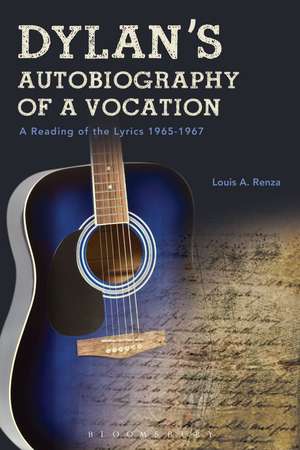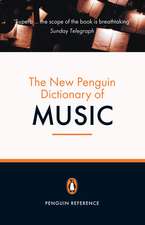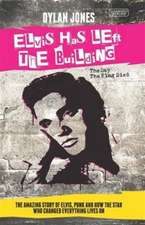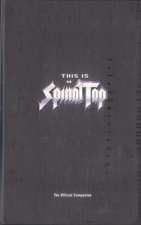Dylan's Autobiography of a Vocation: A Reading of the Lyrics 1965-1967
Autor Emeritus Professor Louis A. Renzaen Limba Engleză Paperback – 17 apr 2019
| Toate formatele și edițiile | Preț | Express |
|---|---|---|
| Paperback (1) | 229.96 lei 6-8 săpt. | |
| Bloomsbury Publishing – 17 apr 2019 | 229.96 lei 6-8 săpt. | |
| Hardback (1) | 775.02 lei 6-8 săpt. | |
| Bloomsbury Publishing – 18 oct 2017 | 775.02 lei 6-8 săpt. |
Preț: 229.96 lei
Preț vechi: 296.65 lei
-22% Nou
Puncte Express: 345
Preț estimativ în valută:
44.01€ • 45.78$ • 36.33£
44.01€ • 45.78$ • 36.33£
Carte tipărită la comandă
Livrare economică 15-29 aprilie
Preluare comenzi: 021 569.72.76
Specificații
ISBN-13: 9781501352010
ISBN-10: 1501352016
Pagini: 224
Dimensiuni: 152 x 229 x 16 mm
Greutate: 0.3 kg
Editura: Bloomsbury Publishing
Colecția Bloomsbury Academic
Locul publicării:New York, United States
ISBN-10: 1501352016
Pagini: 224
Dimensiuni: 152 x 229 x 16 mm
Greutate: 0.3 kg
Editura: Bloomsbury Publishing
Colecția Bloomsbury Academic
Locul publicării:New York, United States
Caracteristici
Written by an eminent scholar in American Literature at Dartmouth University who has written extensively about the lives and perspectives of major literary figures. This is his first book-length piece that focuses on a figure in American music.
Notă biografică
Louis A. Renza is an Emeritus Professor of English at Dartmouth College, USA. He has published critical works on various US writers such as Edgar Allan Poe, Mark Twain, Sarah Orne Jewett, Stephen Crane, Henry James, Ernest Hemingway and Wallace Stevens. Starting in the 1970s and through 2010, he taught a Dartmouth course on Bob Dylan's lyrics. He also directed a 2006 conference at Dartmouth College on Dylan's works, and has published articles on them that include, respectively, critical discussions of such songs as "Went to See the Gypsy" and "Simple Twist of Fate."
Cuprins
DedicationPrefaceAcknowledgmentsTable of ContentsDylan 1965IntroductionChapter One: Return to Me: Bringing It All Back Home Chapter Two: Rebel Without a Cause II: Highway 61 RevisitedChapter Three: Reflections on Self-Reflections: Blonde on Blonde Chapter Four: Fire Down Below: The Basement Tapes Chapter Five: Confessions of a Cowboy Angel: John Wesley Harding EpilogueEndnotes BibliographyPermission AcknowledgmentsIndex
Recenzii
Louis Renza has performed a miracle of sorts, getting to the heart of Dylan's visionary quest for meaning by focusing on his 'vocational dualism,' his endless shuttle between the public and private realms. He shows us again and again that the movement toward an ideal or real presence is defined by its drive toward subjectivity, and that a double sense accompanies every assertion, as Dylan keeps an eye on his vocation, which becomes his 'primary artistic tableau.' I've read countless books on Dylan, but this is the best of them: a stunning narrative of Dylan's major accomplishment. Renza takes us deep into Dylan, and he proves a wise and infinitely patient guide.
To read Chronicles is to know Dylan blurs fact with fancy. Is it a memoir or a ripping good yarn? His friends are there-John Hammond, Tom Petty, Bono-but so is John Wilkes Booth's ghost. Beware the autobiographical "I"-the poetic first person brings mystery. Louis Renza discerns a stubborn otherness in Dylan songs, a habit of thinking twice, with double-tracked lyrics often focused on the whys and wherefores of vocation. He takes the bait and introduces us to this palimpsestuous other, this ghost Dylan that is not quite Dylan, with fascinating results. Intelligent and beautifully written.
Renza leads us through what he calls Dylan's "spiritual vocational quest" of the mid 1960s. An extraordinary journey! Through a series of dazzling close readings, he shows that Dylan's song-poems are best interpreted not as political allegories or simple autobiographical expressions, but as extended (and often tortured) reflections on the process of writing itself.
To read Chronicles is to know Dylan blurs fact with fancy. Is it a memoir or a ripping good yarn? His friends are there-John Hammond, Tom Petty, Bono-but so is John Wilkes Booth's ghost. Beware the autobiographical "I"-the poetic first person brings mystery. Louis Renza discerns a stubborn otherness in Dylan songs, a habit of thinking twice, with double-tracked lyrics often focused on the whys and wherefores of vocation. He takes the bait and introduces us to this palimpsestuous other, this ghost Dylan that is not quite Dylan, with fascinating results. Intelligent and beautifully written.
Renza leads us through what he calls Dylan's "spiritual vocational quest" of the mid 1960s. An extraordinary journey! Through a series of dazzling close readings, he shows that Dylan's song-poems are best interpreted not as political allegories or simple autobiographical expressions, but as extended (and often tortured) reflections on the process of writing itself.









